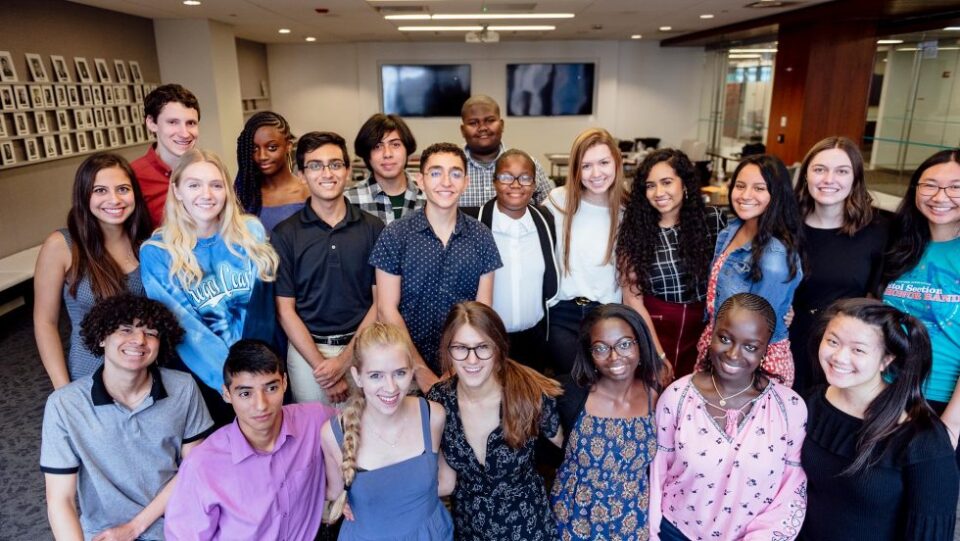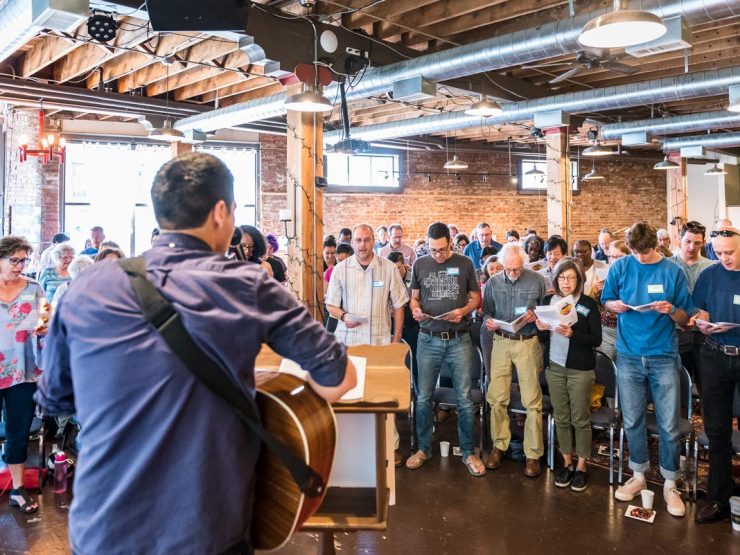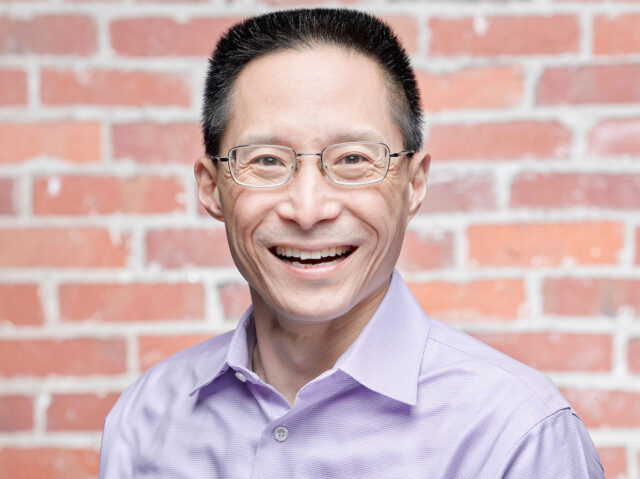Tuhin: Could you tell us a little bit more about what Citizen University does and in what ways as it relates to corporate power and community action?
Eric Liu: Yeah, great question. Our focus is on changing the culture. What does that mean? Well, when we talk about citizenship, when I speak of Citizen University, I take pains to note in the first place we mean this deeper ethical sense of citizenship, concerning being a member of the body, a contributor to community. We’re not talking about documentation or legal status as a U.S. passport holder. But in this broader, more capacious sense of citizenship, we have a simple equation that I think on some levels captures much of what you’re hopefully learning and getting in law school. And that is the equation is power + character = citizenship. That to live like a citizen in this broader ethical sense requires both literacy and power. Understanding what power is, who has it, how it came to be, how things are allocated, where they are, why that is, how one changes that, and then to couple that literacy with a grounding in civic character. This is not just the kind of usual conversation about character as a set of individual virtues like your perseverance or grit or personal commitment, but rather the norms and values that hold up a community, norms of reciprocity, mutuality, service, stewardship, and so forth. Our program’s work seeks to cultivate these values and teach power.
Understanding what power is, who has it, how it came to be, how things are allocated, where they are, why that is, how one changes that, and then to couple that literacy with a grounding in civic character.
One of our programs, of which you are one of the proud alumni, is called the Youth Collaboratory. This is a program that finds remarkable sophomores and juniors from high schools around the country and forms them into cohorts for a year of practical learning together where they gain shared experience of going deeper into understanding power, and applying what they learn to their campuses and hometowns, taking on civic power projects where they live and go to school. They also get mentorship from members of a different program of ours called the National Civic Collaboratory, which is a nationwide mutual aid network of civic innovators drawn from all different sectors and silos of civic work and all parts of the ideological spectrum. It’s a remarkable network of folks who provide guidance and mentorship to young members of the Youth Collaboratory. Those are just two of our programs, and they are fundamentally about activating a sense of ownership and stewardship of community wherever people are.
And how does that relate to your question on the intersection of this broad topic of civic power and civic empowerment with understanding corporate power? One example of how citizen power is coming to fruition is the way that people not only on the left but also on the right, are organizing to counter monopoly, are organizing to counter the distorting effects of the concentration of wealth, either in private individual hands or certainly in the outsized power of conglomerates and corporations that have the power to bend and make markets into what they want. This also goes for monopsony power to limit choice and competition for workers. I wrote a book a few years back that informed some of this analysis at Citizen University called You’re More Powerful Than You Think: A Citizen’s Guide to Making Change Happen. And that book itself draws on a prior book that I wrote with a colleague and friend, Nick Hanauer, called The Gardens of Democracy. And in both these books, I talk about the ways in which there are three laws of power that are all instantiated in the fight that you’re involved in right now in trying to curb and contain the excesses of corporate power.
Law Number One is that power concentrates and compounds if left to itself. In any natural system, the rich get richer. Those who have capital attain more capital of every kind.
Law Number Two is that power justifies itself. And this is where your lab’s work is so fascinating right now because it is unspooling and revealing to people and alienating what has become a naturalized narrative of corporate power. That power justifies itself to say that you should not tax the super wealthy. We should reduce corporate tax burdens because corporations and the super wealthy are “capital J, capital C Job Creators.” We must worship at their altar, and we must not trouble them too much so that their prosperity can leak its way down to the rest of us.
Power justifies itself. And this is where your lab’s work is so fascinating right now because it is unspooling and revealing to people and alienating what has become a naturalized narrative of corporate power.
This trickle-down narrative of the origins of prosperity has no real basis in economic fact, but it has powerful force as a political narrative of justification. And it’s become so powerful over our lifetime, over my lifetime, that it’s become just the background water that we are swimming in. The power of what you and other students are doing right now is to see the water, and to realize that this water is not natural. This water is actually somewhat polluted. This water need not be the water we swim in.
That brings me to the Third Law of Power that Citizen University teaches, which is that, despite the fact that power concentrates and despite the fact that power will justify itself in narratives like trickle-down economics or white supremacy or male supremacy or whatever it may be, power is infinite. Even the most rigged unequal situations, it is possible to generate new power out of thin air through the magic act of organizing. Right now, a wave of people, some of them using the language of the law, like activists like Stacy Mitchell who are leading antimonopoly efforts, fighting by naming the ways in which corporate actors function. It is possible to organize and generate countervailing power. And that’s a reminder that we always try to show in our work that no matter how rigged things may seem, it is possible to fight back.

Citizen University Youth Collaboratory. Source: Citizen University
Tuhin: So powerful prevailing narratives try to convince us that power is a zero-sum game and that the status quo should not be disturbed. So how exactly do you use the Power-is-Infinite Rule with the younger generations to counter these narratives of hyper individualism and corporate power favoring the wealthy?
Eric Liu: I think that whether you’re talking to a high schooler who’s working in their campus or their town, or whether you’re talking to an elite student who’s working on a national level to change narratives and organizing tools, the dynamics are the same, which is to recognize that, just as you said in the first place, we are taught to think of this as zero sum. We are taught to think that: if I try to change the balance or the equation of power, then I’m going to be upsetting the prior allocation in a way that will harm somebody if I’m going to gain power. Part of what we try to teach young people in the Youth Collaboratory is that mutually positive outcomes are possible here. If you’re a young person trying to get your school administration or school board to have a more inclusive policy around transgender students, that does not make cisgender students tyrannized or reduce their liberties or ability to move in the world.
This reasoning also works in the economic world in conflicts between capital and labor. Here in Seattle where I live, I was very involved in the Fight For $15. In The Gardens of Democracy, I help make a case for what we call middle-out economics as the antidote to trickle-down economics. The idea is that the true source of prosperity is not the super wealthy few whose prosperity supposedly leaks down to the rest of us, but rather it is the broad base of people who work for a living. The economy is demand driven, not supply driven in that way. Therefore, raising the minimum wage is not a zero-sum case that says to corporations: “oh, will you please be nicer and do a little charity and give more money to poor workers?” And nor is it a case that says “we don’t care what you want, corporations, we’re going to take an ounce of flesh, a pound of flesh from you so that we can give it to the workers.” The case we made for the Fight for $15 was that this is going to be great for everybody, including for business, because when workers have more money, businesses have more customers. When you raise the wage, you set in motion an increasing feedback loop of increasing demand, and that ends up rebounding to the benefit of everybody. When a worker whose wages go from $9 to $12 or $12 to $15 or $16 an hour, they’re not going to park that extra money in an offshore account in the Cayman Islands. They’re going to spend it. They’re going to circulate it in the economy. They’re going to make rent. They’re going to buy their kids new clothes. They’re going to take their partner out to dinner. And that’s going to be great for business in the community.
We’ve got to think in positive-sum terms about the kind of work we are doing.
That is an example of a narrative that is positive rather than zero-sum. A narrative that is about power being infinite rather than finite. And it has the benefit of not just being a narrative in the sense of being a fairy tale, but in fact being true. We’ve got to think in positive-sum terms about the kind of work we are doing.

Civic Saturday gathering. Source: Citizen University.
Tuhin: The last question concerns a path forward. What path do you see for Citizen University going into the future? What are the main obstacles you think democracy advocacy, civic engagement, and community action face today?
Eric Liu: There are so many fights right now in the effort to shore up our democracy and to reanimate and revive the health of our civic culture and civic life. And so much of what you and your colleagues and classmates are doing is focused on structural reform, on the laws governing corporations, on the policies that determine the relationship and the balance of power between capital and labor and so forth. But I want to emphasize one thing that maybe is another part of the work that you’re involved in the Citical Corporate Theory Lab, and that is the culture side of the equation. Structure matters. Yes, structural reform is huge. As we talked about earlier, I cut my teeth working in D.C., on Capitol Hill, in the Senate, and then at the White House working on structural policy issues. But I’ve come to believe through all these years of all this work, and particularly these last 20 plus years as a citizen of a place, as a citizen of Seattle, that before we can get to structural reform, we’ve got to address cultural reform.
Right now, we have a culture that is hyper individualistic, super materialistic, cynically short-term in its thinking, a culture that is fed by, but also causing, today’s casino capitalism on steroids. If such a culture remains, the room for structural change is very narrow.
Culture precedes structure. Right now, we have a culture that is hyper individualistic, super materialistic, cynically short-term in its thinking, a culture that is fed by, but also causing, today’s casino capitalism on steroids. If such a culture remains, the room for structural change is very narrow.
What our work at Citizen University is focused on is going upstream to change that culture, to remind people that we are not hyper individualistic atoms bouncing off each other in a Darwinian battle to the death, but rather that we are woven together in our fates. We’re trying to change the culture from a short-term quarter-to-quarter way of thinking about profit and loss to a longer-term sense of stewardship and responsibility. We’re trying to change the culture from one that is only focused on rights of certain actors to one that is focused on responsibility and indeed recognizing rights as responsibilities. And in the corporate context, we’re trying to foster a culture that de-emphasizes the primacy of shareholder ends. And we recognize not only the kind of language of stakeholder capitalism that is itself being contested in ESG and the considerations of other factors in the health and viability of a corporate enterprise, but also the understanding that corporations did not exist prior to the rest of society. There is a reason why so many states have corporation commissions, why the secretaries of state in different states are the entities required to register corporations.
When you rewind back to the origins of corporate law and the idea of the role of the corporation, it was a social contract that said the state will give you a charter, the charter will involve some limited liability, and the charter will give you certain forms of immunity and opportunity. But with that charter comes a whole set of obligations to the state and the common good, to the greater good.
A lot of what we’re doing at Citizen University is trying to change the culture that way and remind us, each of us, of what that prevailing sense of responsibility is when we are woven into a democracy that is not automatically self-renewing. I think we have to remind each other that democracy and accountability work only if enough of us believe that they work. It is just in that sense, like money. Money works only if we think that these green, rectangular pieces of paper called legal tender should actually mean something. That the full faith and credit of the United States is worth a darn. We don’t notice how much our mutual faith holds everything together until it begins to crumble.
Citizen University’s work tackles this collective belief issue through programs like the ones I described and another program called Civic Saturday, which is a civic analog to a faith gathering that’s happening in states all around the country right now. We’re trying to rekindle a sense of responsibility, as well as faith in each other and in the idea that a constitutional republic is not something that we take on blindly, but rather something that we take ownership of. The only way we can make this work is to show up and get literate in power, get intentional about character, and find ways to practice both power and character in our everyday lives. And I think you and your colleagues are doing that. Professor Hanson, who was my 1L Torts professor in 1994, is somebody whom I admire for helping to catalyze the work that you all are doing. I am proud to have had a little bit of a sprinkling hand in shaping what you are doing right now via the Youth Collaboratory. But part of what’s exciting to me is that I get to learn from you now, and I get to learn about what you and your colleagues in the Critical Corporate Theory Lab are learning, exploring, articulating, and implementing in the world right now. And I think it’s super important that we add rocket fuel to what you’re doing.
Tuhin: Thank you so much, Eric.
![scales - Logo for The [F]law](https://theflaw.org/wp-content/uploads/2022/07/flaw_scale_divider.png)



![[F]law School Episode 7: Profit Over People](https://theflaw.org/wp-content/uploads/2024/11/Housing-Podcast-Episode-hero-image-640x427.webp)
![[F]law School Episode 13: The Migrant Trap](https://theflaw.org/wp-content/uploads/2025/03/Drury_FB2-e1742192209662-640x427.png)






